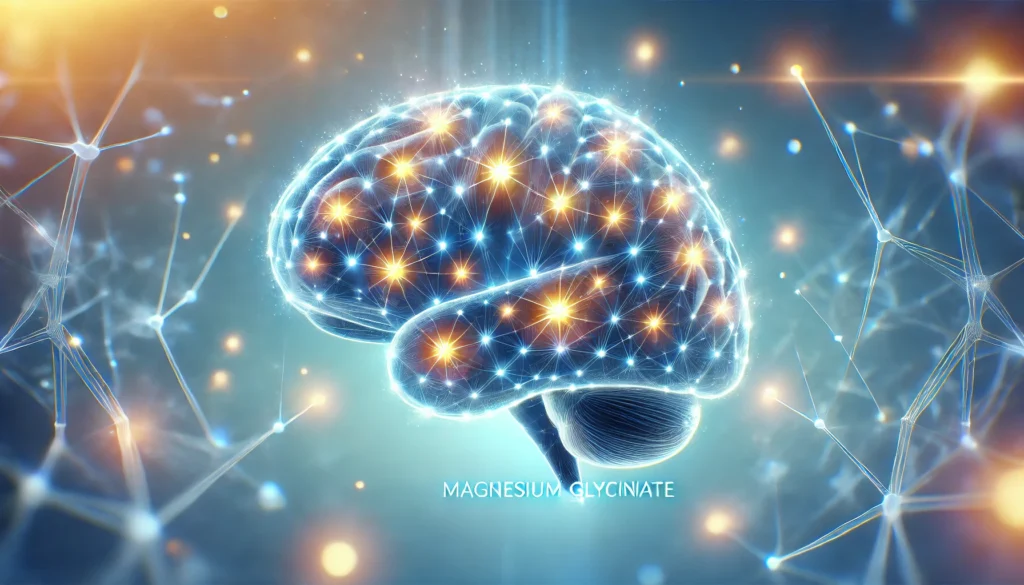Magnesium is a vital mineral involved in over 300 biochemical reactions in the body. It plays a crucial role in nerve function, muscle health, and mood regulation. The connection between magnesium and anxiety isn’t new; research has consistently shown that magnesium deficiency can lead to increased stress and anxiety levels.
You may also like: Natural Supplements for Effective Anxiety Relief

The Biochemistry of Magnesium
Magnesium is essential for numerous bodily functions. It acts as a cofactor in enzymatic reactions that regulate biochemical pathways. These pathways are crucial for converting food into energy, synthesizing proteins, and repairing DNA and RNA. The mineral also plays a role in modulating the electrical activity of cells, which is important for maintaining normal heart rhythms and muscle contractions.
Magnesium’s Impact on Neurotransmitters
Beyond its general biochemical roles, magnesium directly influences neurotransmitter activity. Neurotransmitters are chemical messengers that communicate signals between nerve cells. Magnesium helps modulate the release of neurotransmitters like serotonin and dopamine, both of which are critical in mood regulation. A deficiency can disrupt this balance, potentially leading to mood disorders, including anxiety and depression.
Historical Perspective on Magnesium and Mental Health
The therapeutic use of magnesium for mental health issues dates back centuries. Ancient civilizations used magnesium-rich mineral baths as a treatment for emotional and physical ailments. Modern science has built on this historical knowledge, investigating magnesium’s potential in treating conditions such as anxiety and depression. This historical context underscores the long-standing recognition of magnesium’s impact on mental well-being.
The Science Behind Magnesium for Anxiety
Magnesium is believed to exert its calming effects by regulating neurotransmitters, which send messages throughout the brain and nervous system. It also binds to gamma-aminobutyric acid (GABA) receptors, an inhibitory neurotransmitter known for its calming effect on the brain. This interaction helps reduce the excitability of neurons, leading to a decrease in anxiety and stress.
Mechanisms of Action
When magnesium binds to GABA receptors, it enhances the inhibitory effects of GABA. This action leads to a calming effect on the brain, reducing neuronal excitability. By supporting GABAergic activity, magnesium helps maintain a balance between excitatory and inhibitory signals in the brain, essential for preventing overstimulation that can result in anxiety.
Magnesium Glycinate: Superior Absorption
Magnesium glycinate is a form of magnesium bound to glycine, an amino acid with its own calming properties. This bond not only supports the calming effect of magnesium but also significantly improves absorption. The glycine component aids in gastrointestinal comfort, making magnesium glycinate less likely to cause digestive issues compared to other forms of magnesium.
Clinical Studies and Findings
Several studies have explored the impact of magnesium supplementation on anxiety. Clinical trials have demonstrated that individuals with magnesium deficiency who receive magnesium supplements often report significant reductions in anxiety symptoms. These findings support the hypothesis that magnesium supplementation can be an effective component of anxiety management strategies.

Magnesium Glycinate and Vitamin D3: A Powerful Duo
While magnesium glycinate is powerful on its own, its effects can be amplified when combined with Vitamin D3. Both nutrients play complementary roles in the body, and their synergy can have a profound impact on mental health.
Synergistic Effects on Absorption
Vitamin D3 facilitates the absorption of magnesium in the gut, enhancing the bioavailability of magnesium glycinate. This synergistic relationship ensures that the body efficiently utilizes the supplemented magnesium, maximizing its potential benefits for mood regulation and anxiety relief.
Vitamin D3’s Role in Mood Regulation
Vitamin D3 is known for its role in calcium metabolism and bone health, but it also has significant implications for mental health. It influences the production of neurotransmitters and supports brain health. Low levels of Vitamin D3 have been linked to mood disorders, highlighting the importance of maintaining adequate levels for optimal mental well-being.
Evidence of Combined Benefits
Research is increasingly highlighting the benefits of combining magnesium and Vitamin D3 for mental health. Studies suggest that this combination can enhance the modulation of GABAergic activity, which plays a crucial role in reducing anxiety and promoting a stable mood. The complementary effects of these nutrients offer a promising natural approach to mental health management.
Practical Applications and Dosage Recommendations
If you’re considering magnesium glycinate as part of your anxiety management toolkit, it’s essential to understand how to incorporate it effectively into your routine.
Personalized Dosage Guidelines
The recommended dosage of magnesium glycinate for anxiety varies depending on individual needs, but a common starting point is 200-400 mg per day. Personalizing the dosage is important, as factors like age, gender, and health status can influence magnesium requirements. Consulting with a healthcare provider ensures that the dosage aligns with your specific health needs.
Administering Magnesium Glycinate
Magnesium glycinate is best taken with food to enhance absorption and minimize potential gastrointestinal discomfort. Many find it beneficial to split the dosage throughout the day, taking it in the morning and evening to maintain stable blood magnesium levels. This approach helps sustain a calming effect and supports overall well-being.
Monitoring Vitamin D3 Intake
For Vitamin D3, the recommended dosage often ranges from 1000-4000 IU daily, but individual requirements can vary significantly. Factors such as sun exposure, skin pigmentation, and geographic location affect Vitamin D synthesis, making personalized recommendations crucial. Regular monitoring of blood levels can help optimize supplementation and prevent deficiency or toxicity.
Potential Side Effects and Considerations
While magnesium glycinate is generally well-tolerated, excessive intake can lead to side effects such as diarrhea and abdominal discomfort. It’s important to adhere to recommended dosages and consult with a healthcare professional, especially if you’re taking other medications.
Monitoring and Adjusting Intake
Regularly reviewing your magnesium and Vitamin D3 intake is important for maintaining optimal health. Blood tests can help assess magnesium levels, ensuring that supplementation meets but does not exceed your body’s needs. Periodic evaluations with a healthcare provider can guide necessary adjustments to your supplementation regimen.
Interactions with Medications and Conditions
Magnesium and Vitamin D3 can interact with certain medications, potentially altering their effects. For example, magnesium can affect the absorption of antibiotics and osteoporosis medications. Understanding these interactions is crucial, especially for individuals managing chronic health conditions or taking multiple medications.

Current Trends and Future Implications
The popularity of magnesium glycinate as a natural remedy for anxiety is part of a broader trend towards natural and integrative approaches to mental health. As more individuals seek alternatives to traditional pharmaceuticals, the demand for natural supplements like magnesium glycinate is likely to increase.
The Rise of Natural Health Solutions
The shift towards natural health solutions reflects a growing desire for safer, more holistic approaches to well-being. Consumers are increasingly questioning conventional medications and exploring natural alternatives that offer fewer side effects. This trend is driving innovation and research in the field of natural supplements.
Research Advancements and Insights
Ongoing research continues to unveil the potential of magnesium glycinate in mental health care. Future studies may provide deeper insights into optimal dosages, long-term effects, and its role alongside other treatments. As scientific understanding evolves, magnesium glycinate could become an integral part of comprehensive mental health strategies.
Public Awareness and Education
As awareness of magnesium glycinate’s benefits grows, education becomes key to informed decision-making. Health professionals, educators, and advocates play a crucial role in disseminating accurate information about magnesium supplementation. Empowering individuals with knowledge supports proactive health management and encourages the adoption of natural remedies.
Balancing Scientific Facts with Practical Advice
For health coaches, biohackers, and science journalists, magnesium glycinate represents an exciting area of exploration. It offers a blend of scientific backing and practical application, making it an attractive option for those seeking to enhance mental well-being naturally.
Integrating Science and Wellness
Magnesium glycinate’s appeal lies in its foundation in scientific research combined with practical applications in daily life. For professionals in the health and wellness field, understanding the science behind magnesium’s effects enhances their ability to guide clients and audiences in making informed health decisions.
Practical Takeaways for Everyday Use
- Magnesium glycinate is a highly bioavailable form of magnesium that can effectively reduce anxiety.
- Combining magnesium glycinate with Vitamin D3 can enhance its mood-boosting effects.
- Dosage should be personalized and monitored by a healthcare professional to avoid potential side effects.
- The growing interest in natural anxiety remedies is paving the way for further research and application of magnesium glycinate in mental health.
Future Directions in Natural Health
The exploration of magnesium glycinate’s potential is just one part of a broader movement towards embracing natural health solutions. As more people seek alternatives to traditional pharmaceuticals, the role of natural supplements in mental health care is likely to expand. This shift presents opportunities for research, innovation, and the development of new strategies for enhancing well-being.
By understanding and leveraging the benefits of magnesium glycinate, individuals can take proactive steps towards managing anxiety naturally, paving the way for improved mental health and overall well-being.
Further Reading:
Does Magnesium for Anxiety Really Work?
Magnesium for Anxiety: Does It Help?
Magnesium for Anxiety: Is It Effective?
Important Note: The information contained in this article is for general informational purposes only, and should not be construed as health or medical advice, nor is it intended to diagnose, prevent, treat, or cure any disease or health condition. Before embarking on any diet, fitness regimen, or program of nutritional supplementation, it is advisable to consult your healthcare professional in order to determine its safety and probable efficacy in terms of your individual state of health.
Regarding Nutritional Supplements Or Other Non-Prescription Health Products: If any nutritional supplements or other non-prescription health products are mentioned in the foregoing article, any claims or statements made about them have not been evaluated by the U.S. Food and Drug Administration, and such nutritional supplements or other health products are not intended to diagnose, treat, cure, or prevent any disease.


